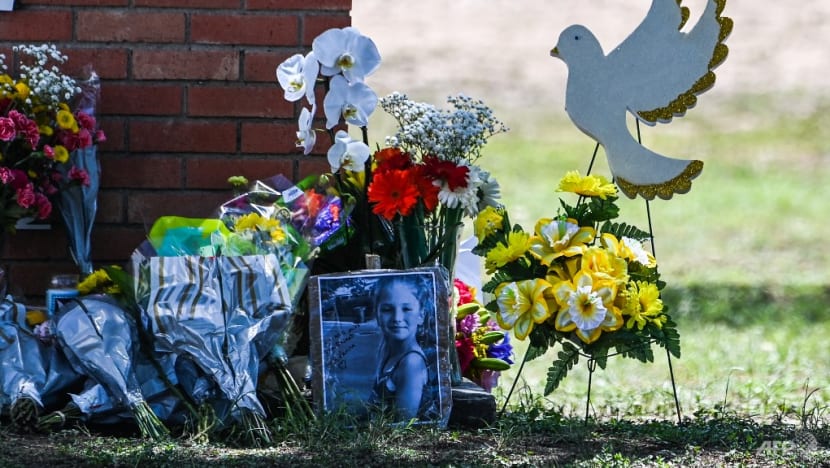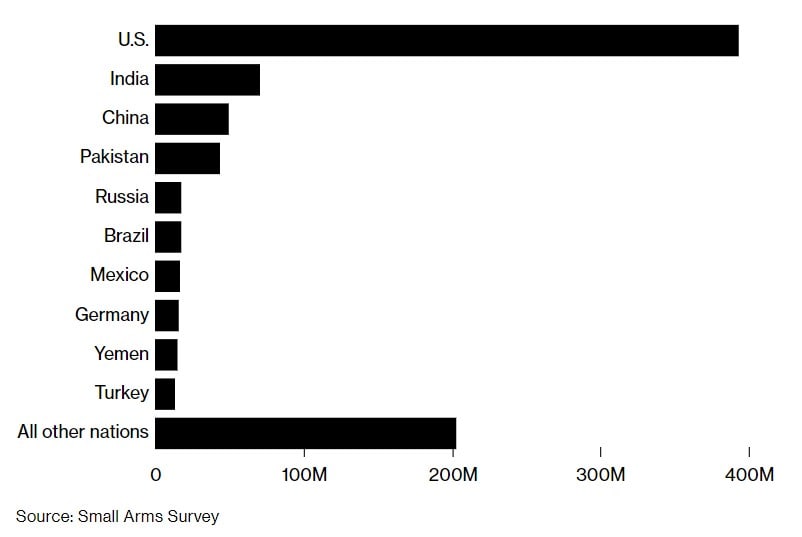How mass shootings and gun culture affect US gun laws

A photo of Makenna Lee Elrod, a victim of the shooting, is seen by flowers placed on a makeshift memorial in front of Robb Elementary School in Uvalde, Texas, on May 25, 2022. (Photo AFP/CHANDAN KHANNA)
Each new mass shooting in the US reignites debate over the country’s treatment of gun rights as virtually sacrosanct. Americans own more guns than anybody else on Earth, even adjusted for population. (Yemenis are second.)
Firearms were involved in the deaths of more than 45,000 people in the US in 2020, 54 per cent of which were suicides. But Americans disagree along partisan political lines on whether that’s a major issue for the country.
MASS SHOOTINGS IN THE US
While mass shootings account for just a fraction of US gun deaths, they attract the most attention. In May 2022, 19 children and two teachers were killed at an elementary school in rural Texas, a week after 10 were killed at a supermarket in Buffalo, New York.
In a report released the same month, the Federal Bureau of Investigation identified 61 “active shooter” attacks in 2021 that killed 103 people - the most annual deaths since 2017, which was the year a sniper opened fire at a concert in Las Vegas, killing 58 people.
The murder of 17 people at a high school in Parkland, Florida in 2018 gave voice to a new group of activists - students - who demanded tougher controls. Public opinion shifted in that direction, but has since returned to 2017 levels.
A Pew Research Center poll in 2021 found that 53 per cent of Americans said laws should be more strict, down from 60 per cent in 2019. In the survey, 73 per cent of Democrats and 18 per cent of Republicans said they considered gun violence to be a “very big problem” for the US.
Gun rules are largely determined by the states, and since the Parkland shooting, new restrictions have been enacted in a majority of them. The measures strengthened requirements for background checks on gun purchasers, banned the use of attachments that enable a semiautomatic rifle to fire faster, and aimed to keep guns out of the hands of domestic abusers.
In 2021, New York became the first state to allow people harmed by guns to take firearm dealers and manufacturers to court. But movement toward stricter controls has not been uniform. It’s now legal in 21 states to carry hidden guns in public without a permit, compared with four states in 2014.

Related:
INSIDE AMERICAN GUN CULTURE
The US is one of three countries to include gun-ownership rights in its constitution, along with Mexico and Guatemala. The right “of the people to keep and bear arms,” enshrined in the Second Amendment, was established in the 18th century to allow states to form militias to protect themselves against oppression by the federal government.
In 2008, the US Supreme Court ruled that the amendment also protects the gun rights of individuals. Beyond the legalities, the gun is a cultural icon in the US. It was a necessary instrument of soldiers in the Revolutionary War and cowboys roaming the Wild West.
More recently, semiautomatic guns that fire bullets in rapid succession - also called assault weapons - have gained popularity among law-abiding gun owners and mass killers alike. Mass shootings in other countries, although less common, have also led to debates over regulation. A massacre of 50 people at two mosques in New Zealand in early 2019 prompted an overhaul of gun laws there.
THE GUN CONTROL DEBATE
Gun owners, many of whom live in rural areas, view gun controls as an attack on their way of life.
The National Rifle Association, the dominant pro-gun group, has argued that criminals simply ignore gun regulations. Many NRA-backed lawmakers have said shootings don’t prove the need for new regulations and that it’s better to arm more people, including teachers, so they can defend themselves and others.
They’ve noted that after Congress let a ban on assault weapons expire in 2004, shootings in the US declined.
Gun-control groups - some backed by Michael Bloomberg, founder and majority owner of Bloomberg LP, the parent of Bloomberg News - say the drop - part of an overall decrease in violent crime - occurred for other reasons, notably improved policing. They also credit strict gun laws enacted in Australia after a 1996 killing spree that left 35 people dead with all but ending mass shootings there.













